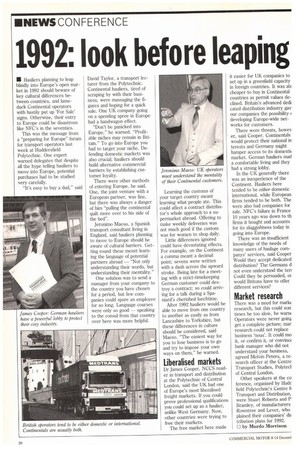1992: look before leaping
Page 18

If you've noticed an error in this article please click here to report it so we can fix it.
IN Hauliers planning to leap blindly into Europe's open market in 1992 should beware of key cultural differences between countries, and lameduck Continental operators with hastily put up 'For Sale' signs. Otherwise, their entry to Europe could be disastrous like NFC's in the seventies.
This was the message from a "preparing for Europe" forum for transport operators last week at Huddersfield Polytechnic. One expert warned delegates that despite all the hype telling hauliers to move into Europe, potential purchases had to be studied very carefully.
"It's easy to buy a dud," said David Taylor, a transport lecturer from the Polytechnic. Continental hauliers, tired of scraping by with their business, were massaging the figures and hoping for a quick sale. One UK company going on a spending spree in Europe had a bandwagon effect.
"Don't be panicked into Europe," he warned. "Profitable niches may remain in Britain." To go into Europe you had to target your niche. Defending domestic markets was also crucial; hauliers should build alternative commercial barriers by establishing customer loyalty.
There were other methods of entering Europe, he said. One, the joint venture with a European partner, was fine, but there was always a danger of him "pulling the continental quilt more over to his side of the bed".
Jeronimo Maeso, a Spanish transport consultant living in England, said hauliers planning to move to Europe should be aware of cultural barriers. Getting round these meant learning the language of potential partners abroad — "Not only understanding their words, but understanding their mentality."
One solution was to send a manager from your company to the country you have chosen for a period, but few companies could spare an employee for so long. Language courses were only so good — speaking to the consul from that country over here was more helpful. Learning the customs of your target country meant learning what people ate. This could affect a contract distributor's whole approach to a supermarket abroad. Offering to make weekly deliveries was not much good if the custom was for women to shop daily.
Little differences ignored could have devastating effects. For example, on the Continent a comma meant a decimal point; sevens were written with a dash across the upward stroke. Being late for a meeting with a strict-timekeeping German customer could destroy a contract; so could arriving for a talk during a Spaniard's cherished lunchtime.
After 1992 hauliers would be able to move from one country to another as easily as from Lancashire to Yorkshire, but these differences in culture should be considered, said Maeso. "The easiest way for you to lose business is to go and try to impose your own ways on them," he warned.
Liberalised markets
Dr James Cooper, NCCS reader in transport and distribution at the Polytechnic of Central London, said the UK had one of Europe's most liberalised freight markets. If you could prove professional qualifications you could set up as a haulier, unlike West Germany. Now, other countries were trying to free their markets.
The free market here made it easier for UK companies to set up in a greenfield capacity in foreign countries. It was als cheaper to buy in Continental countries as permit values declined. Britain's advanced dedi cated distribution industry gay our companies the possibility developing Europe-wide networks for customers.
There were threats, howev er, said Cooper. Continentals would protect their national in terests and Germany might hamper access to its domestit market. German hauliers mad a comfortable living and they had a strong lobby.
In the UK generally there was an inexperience of the Continent. Hauliers here tended to be either domestic international, while European firms tended to be both. The were also bad companies for sale. NFC's failure in France 10 years ago was down to th firms it bought and accounts for its sluggishness today in going into Europe.
There was an insufficient knowledge of the needs of many users of haulage cornpanys' services, said Cooper Would they accept dedicated distribution? The Germans d not even understand the teni Could they be persuaded, ot would Britons have to offer different services?
Market research
There was a need for mark research, but this could son times be too slow, he warn( Operators were never goini get a complete picture; mar research could not replace business 'nous'. It could mo it, or confirm it, or convinc( bank manager who did not understand your business, agreed Melvin Peters, a research officer at the Centre Transport Studies, Polytecl of Central London.
Other speakers at the co ference, organised by HudC field Polytechnic's Centre ft Transport and Distribution, were Stuart Roberts and P Bramley, of manufacturers Rowntree and Lever, who plained their companies' di: tribution plans for 1992. O by Murdo Morrison


















































































